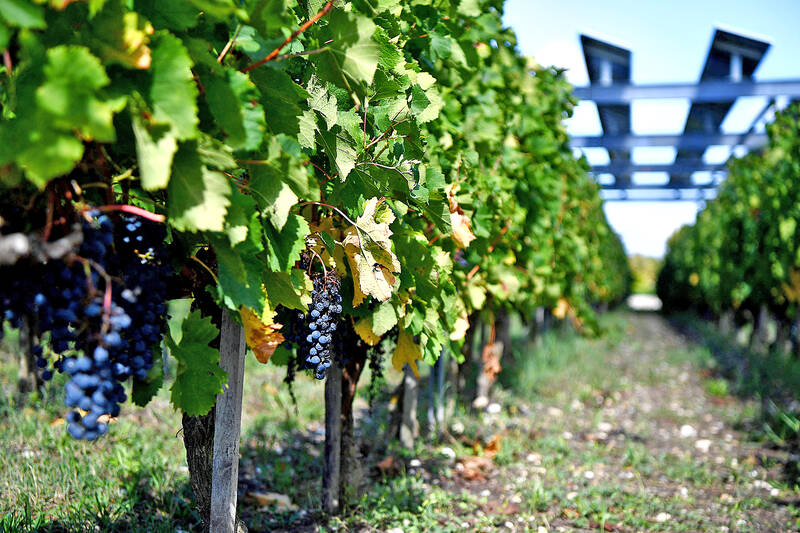What makes a good or bad year for wine is a question that vexes not only vintners, but also scientists, who have long looked to weather conditions to provide the answer. A new study published this week in the journal iScience says that climate change could contribute to superior vintages — at least up to a point.
By analyzing decades worth of wine critic scores from Bordeaux, the research shows that good years are characterized by warmer temperatures, greater differences between winter and summer, and earlier, shorter growing seasons.
All conditions that are becoming more frequent as a result of human-caused planetary warming.

Photo: AFP
“I don’t think that climate change is a good thing,” said Andrew Wood, lead author of the study.
Even though it appears to be improving wine growing conditions, climate change also exposes vineyards to more extreme events, from heightened risk of fires in summer to more frost and hail storms in spring, Wood said.
Even if good years are characterized by a dry and hot summer, too severe a drought can be devastating.
When a certain threshold is reached, quality drops dramatically “and you can even get the situation in which grapes are dropped from the vine,” Wood said.
“We could be very close to the point at which it stops becoming better, and it starts being a lot worse,” the University of Oxford scientist added. “We just don’t know.”
Wood and colleagues paired detailed climate data with annual wine critic scores from the Bordeaux wine region in southwest France from 1950 to 2020, finding that, for the time being, the trend is positive.
They focused on Bordeaux because its wine region relies exclusively on rainfall for irrigation and because of the long term records of wine scores.
Of course, wine judging is subjective and unblinded, meaning the critics know what they are tasting.
However, the paper says that because there is broad consensus about what makes good versus bad wine, the taste scores offer a reliable means to monitor how crops are changing over time — and they attempted to statistically control for the effects of improving winemaking technology.
“People generally prefer stronger wines, which age for longer and give you richer, more intense flavors, higher sweetness and lower acidity,” Wood said. “And with climate change — generally, we are seeing a trend across the world that with greater warming, wines are getting stronger.”
Higher temperatures lead to more photosynthesis, which in turn produces more sugar and a higher alcohol content. Previous studies identified the beneficial effect of rainy winters and high temperatures in summer.
The researchers in the current study showed that the other seasons also play an important role: wet and warm springs, and dry and cool autumns, are also linked with better rated wines.
They achieved this by matching highly localized, year-round weather data, with critics’ ratings of individual “appellation d’origine controlee” in Bordeaux.
The same trends could hold true of other wine-growing regions of the world, Wood said, but added that it is not something to toast.
“The problem in scenarios where it gets really hot is water if plants don’t have enough, they eventually fail, and when they fail, you lose everything,” he said.

Intel Corp chief executive officer Lip-Bu Tan (陳立武) is expected to meet with Taiwanese suppliers next month in conjunction with the opening of the Computex Taipei trade show, supply chain sources said on Monday. The visit, the first for Tan to Taiwan since assuming his new post last month, would be aimed at enhancing Intel’s ties with suppliers in Taiwan as he attempts to help turn around the struggling US chipmaker, the sources said. Tan is to hold a banquet to celebrate Intel’s 40-year presence in Taiwan before Computex opens on May 20 and invite dozens of Taiwanese suppliers to exchange views

Application-specific integrated circuit designer Faraday Technology Corp (智原) yesterday said that although revenue this quarter would decline 30 percent from last quarter, it retained its full-year forecast of revenue growth of 100 percent. The company attributed the quarterly drop to a slowdown in customers’ production of chips using Faraday’s advanced packaging technology. The company is still confident about its revenue growth this year, given its strong “design-win” — or the projects it won to help customers design their chips, Faraday president Steve Wang (王國雍) told an online earnings conference. “The design-win this year is better than we expected. We believe we will win

Chizuko Kimura has become the first female sushi chef in the world to win a Michelin star, fulfilling a promise she made to her dying husband to continue his legacy. The 54-year-old Japanese chef regained the Michelin star her late husband, Shunei Kimura, won three years ago for their Sushi Shunei restaurant in Paris. For Shunei Kimura, the star was a dream come true. However, the joy was short-lived. He died from cancer just three months later in June 2022. He was 65. The following year, the restaurant in the heart of Montmartre lost its star rating. Chizuko Kimura insisted that the new star is still down

While China’s leaders use their economic and political might to fight US President Donald Trump’s trade war “to the end,” its army of social media soldiers are embarking on a more humorous campaign online. Trump’s tariff blitz has seen Washington and Beijing impose eye-watering duties on imports from the other, fanning a standoff between the economic superpowers that has sparked global recession fears and sent markets into a tailspin. Trump says his policy is a response to years of being “ripped off” by other countries and aims to bring manufacturing to the US, forcing companies to employ US workers. However, China’s online warriors